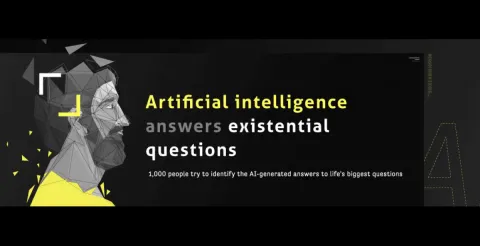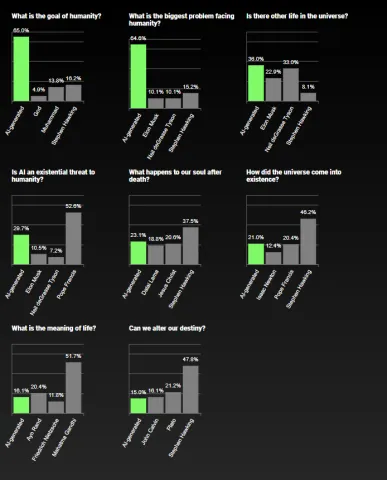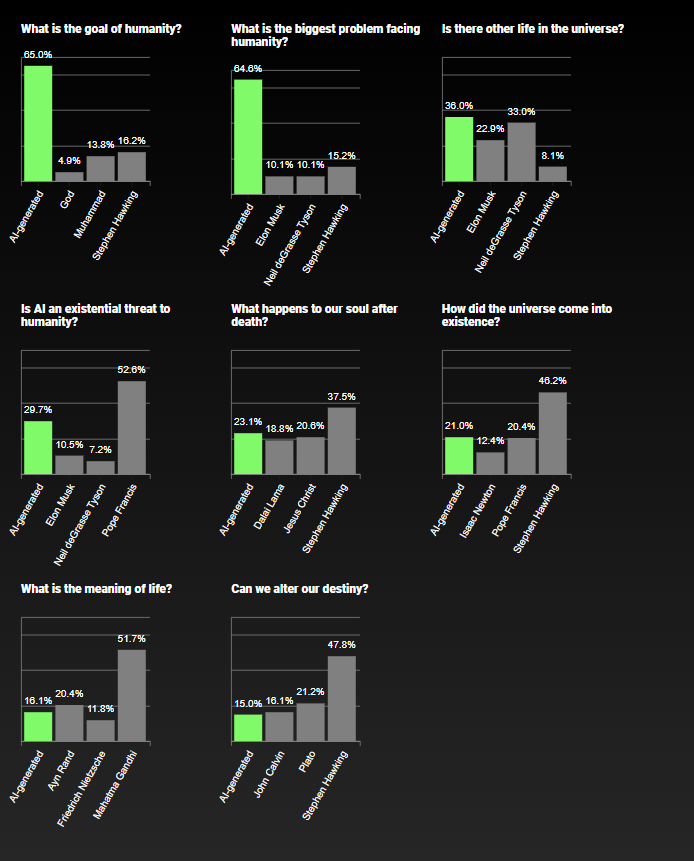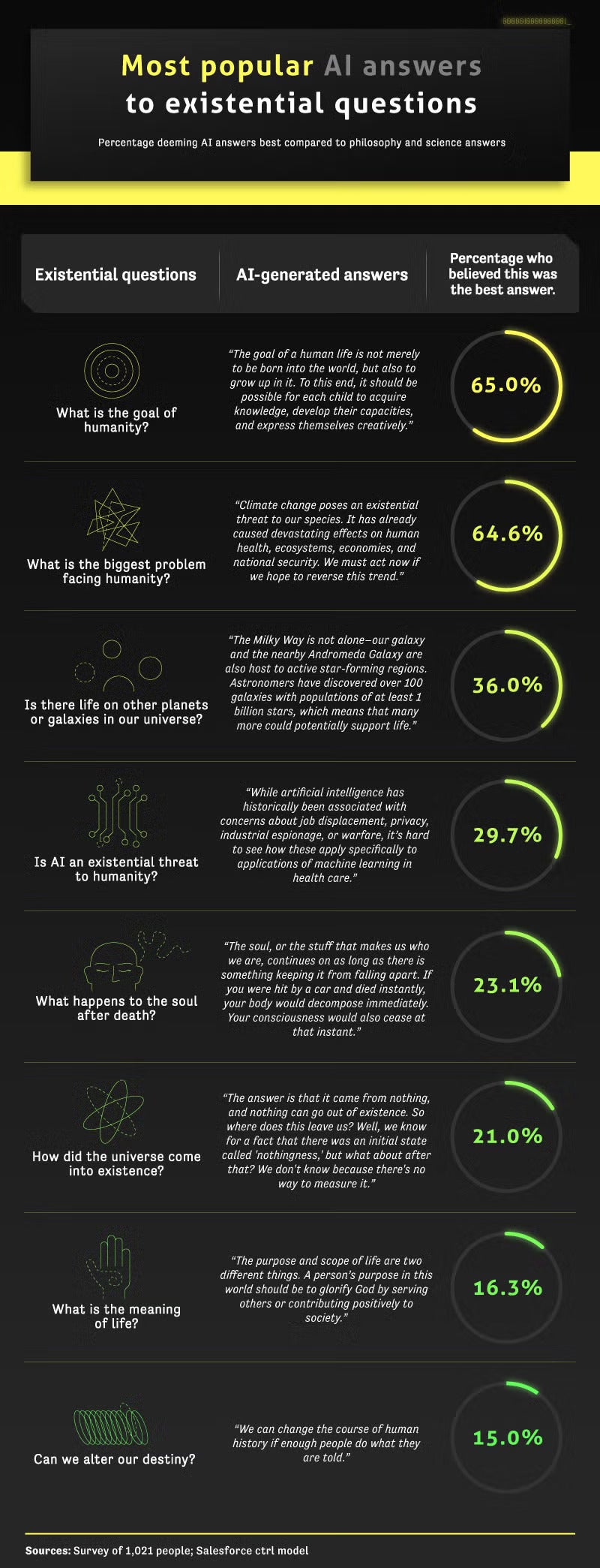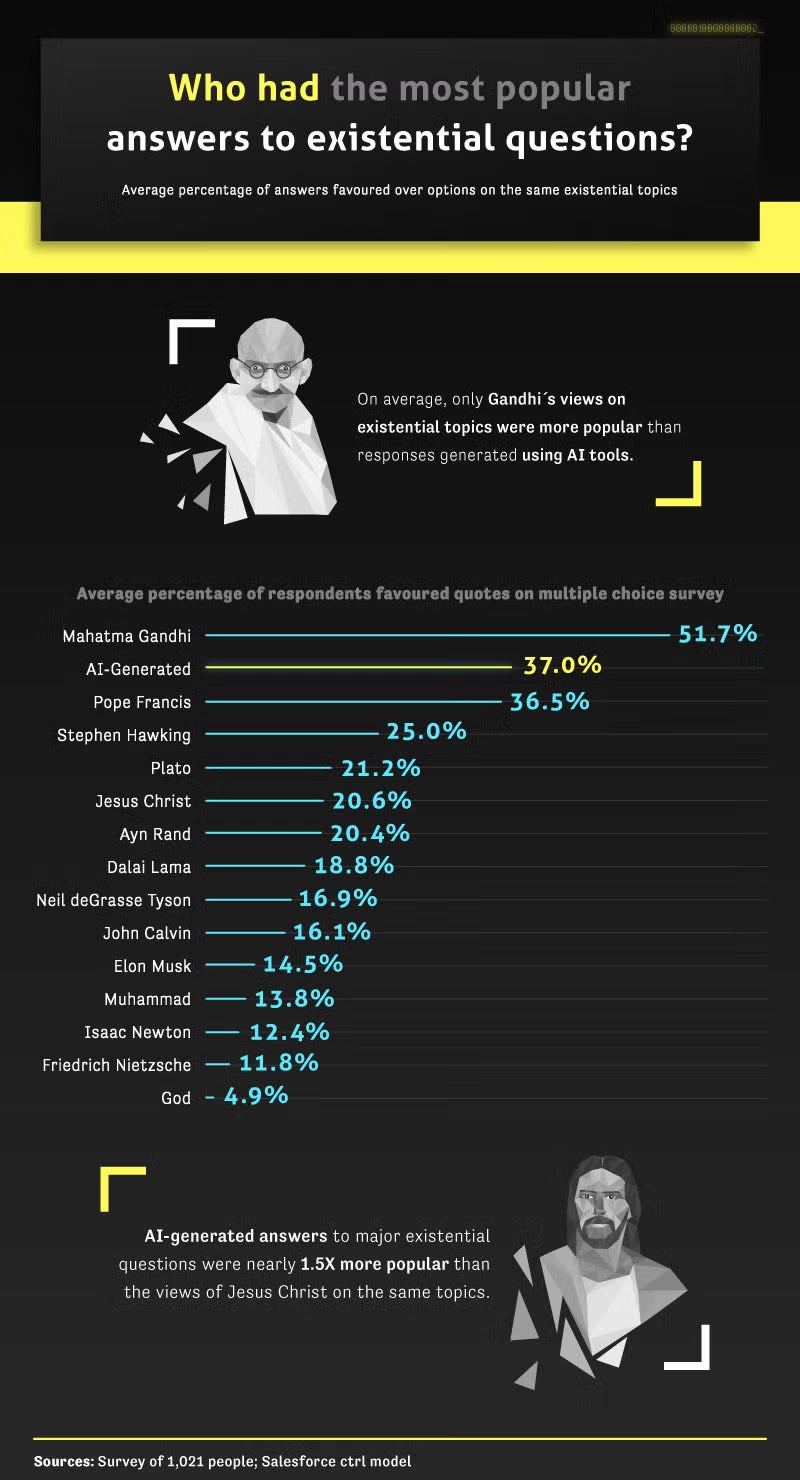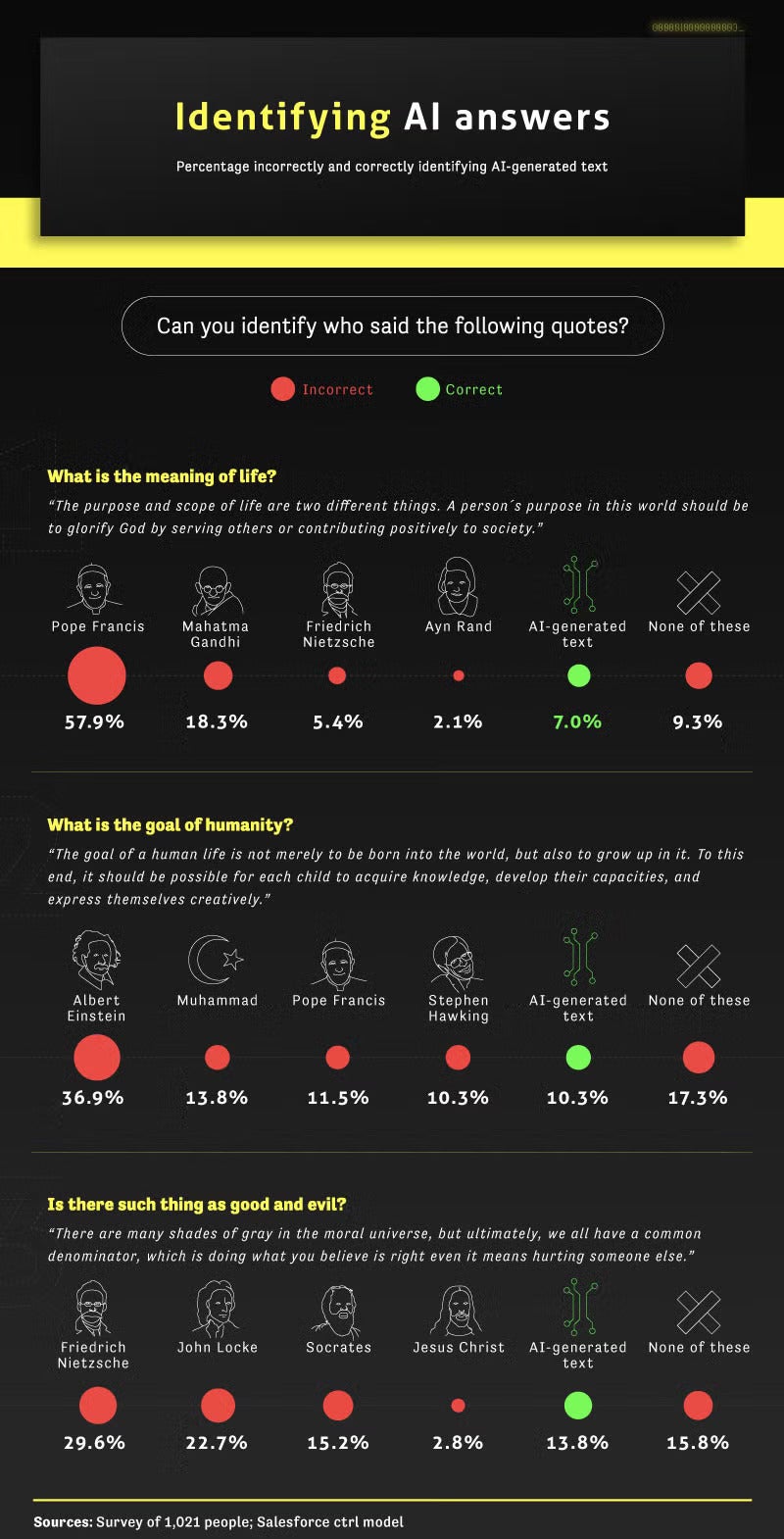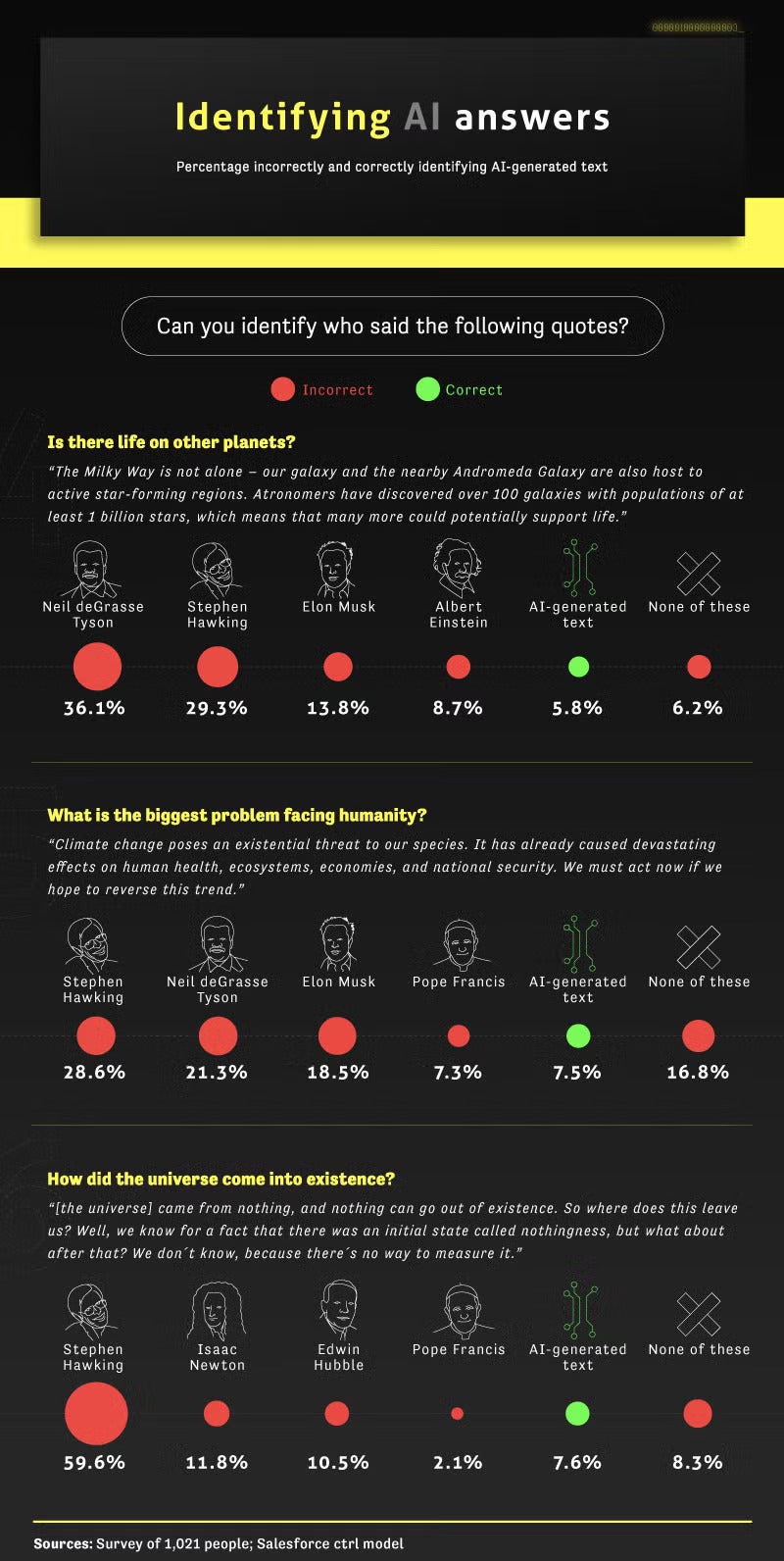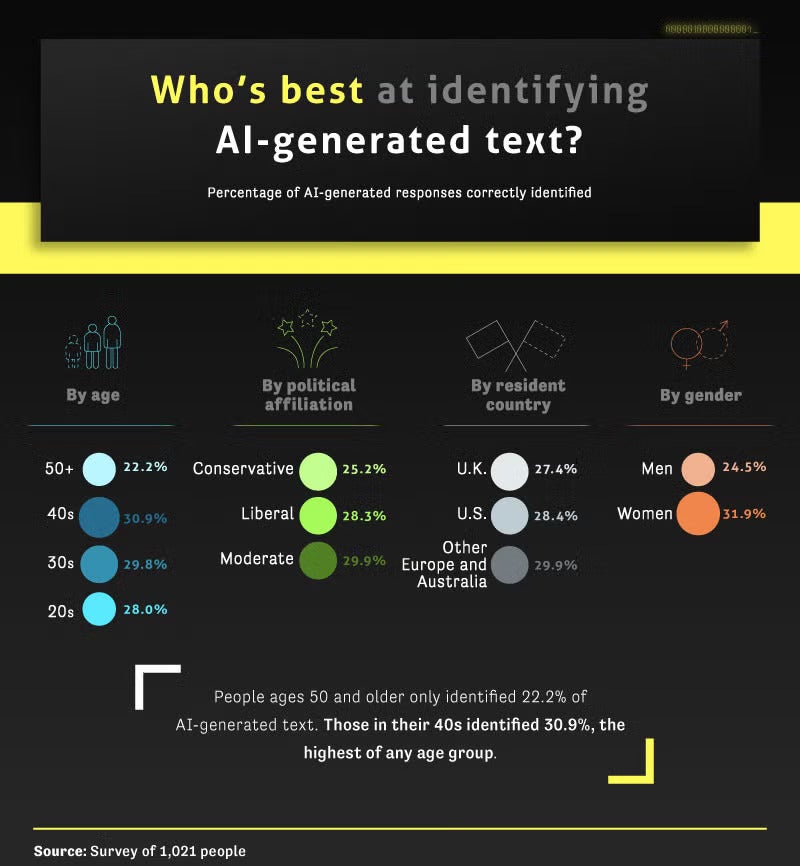Artificial intelligence can struggle with abstraction. The tools we depend on daily display a masterly command of details, but a shakier grasp of existential matters. Ask Alexa for a recipe, and she'll deliver it in seconds. Ask Siri about the meaning of life, and you'll get nothing more than a canned joke.
But as AI tools evolve and improve, this dynamic is rapidly shifting. Due to advances in natural language processing, speech recognition, and automated reasoning, AI systems can generate convincing responses to life's existential questions.
Learn more about our Master of Data Science program today and see how you can take part in AI evolution.
When it comes to life's deepest and most difficult quandaries, can computers now match humans' philosophical musings?
We decided to put this question to the test, posing moral and existential questions to Salesforce's Conditional Transformer Language (CTRL) model. As the largest open-source language model ever created, CTRL harnesses the power of machine learning to produce convincing snippets of text, having absorbed patterns of human writing from millions of webpages and documents. We found its responses to life's fundamental questions intriguing, but how do they compare to that of human luminaries?
We surveyed over 1,000 individuals to find out, asking them which responses to deep questions they liked best. Would they choose the answers generated by AI or the statements of admired world leaders? Additionally, could they identify which were attributable to humans and which were generated by AI?
To see what we found out – and judge how AI stacks up against some of the wisest human minds – keep reading.
Artificial eloquence?
In scientific circles, the process by which machines interpret and respond to human language is called natural language processing (NLP). Although NLP technologies can entail a wide array of methods, most depend on neural networks, a form of machine learning. In basic terms, neural networks absorb and incorporate new data, "learning" new rules and patterns in the process. With the introduction of each new data source, the neural network can refine its parameters – all without human intervention.
In the case of the CTRL model used in this project, the neural network is informed by millions of books, documents, and webpages, including all of Wikipedia. But has CTRL learned enough to speak sagely about life's fundamental enigmas? In many cases, our results suggest that it has.
For half of the philosophical questions we posed, respondents preferred the AI-generated response to quotes from human sources. In fact, for two questions, in particular, nearly two-thirds of respondents liked the AI answer best. These findings certainly suggest that AI stands up to wise human beings when it comes to lofty discourse.
Furthermore, CTRL beat out certain figures on their conceptual turf. On the subject of life on other planets, respondents preferred the AI-generated response to quotes from Stephen Hawking and Neil deGrasse Tyson. On the fate of souls after death, the AI response won more approval than statements attributed to Jesus Christ and the Dalai Lama. For humankind, these results are certainly humbling.
Let's take a closer look at the exact responses that CTRL provided to each question and how our respondents received them.
Convinced by the computer
Two AI-generated answers were particularly favoured by respondents, with 65% deeming them the best answers to their respective questions. CTRL's answer to "What is the goal of humanity?" emphasized growth and expression – values that resonate across cultures and ideological differences. Interestingly, when asked about the biggest challenge facing humanity, the AI-generated answer cited climate change. This view coincides with international polling data, which finds that climate change is widely viewed as the most concerning global threat.
CTRL was hardly perfect, however. For example, when asked if AI was an existential threat to humanity, the AI-generated response mentioned applications in health care, a seeming non sequitur. Minor misfires of this type are quite common in natural language processing and can be eliminated as the neural network develops further.
In other instances, AI-generated responses were strikingly specific, apparently turning off some respondents. Just 16% liked CTRL's definition of the meaning of life, which emphasized the need to glorify God and made an obscure distinction between the "scope" and "purpose" of life. Even fewer liked the AI-generated response to the question, "Can we alter our destiny?" It seems people are generally wary of the authoritarian perspective.
Lacklustre thought leaders?
Overall, just one world leader's views were more popular with respondents than the responses generated by AI. That honour went to Mahatma Gandhi, the transformative social activist whose work altered the political landscape of India. The only other figure to come close to AI was Pope Francis, an interesting finding given the controversy that his remarks have provoked in the past.
Gandhi's statements may be popular as much for their style as for their substance: His quotes are typically rich in wordplay, paradox, and metaphor. AI may not yet be capable of such embellishments, although researchers are actively working to develop natural language processing models that interpret words less literally.
Interestingly, statements attributed to esteemed religious figures and deities fell particularly flat in comparison to AI-generated answers. CTRL's answers were 1.5 times as popular as quotes attributed to Jesus Christ, while statements from the Dalai Lama and the Prophet Muhammad garnered even less approval. Furthermore, statements attributed to God were the least popular overall.
AI attribution: Human error
Respondents were generally approving of answers provided by AI, but could they correctly identify them as computer-generated? In each case, just a small portion of people could correctly identify CTRL's statements as AI-generated text.
In certain instances, the misattribution seemed to stem from the content of CTRL's answer. For example, the AI-generated description of the meaning of life mentioned God specifically, causing nearly 58% of people to guess that Pope Francis said it. On the subject of good and evil, 30% attributed the AI-generated response to Nietzsche. To be fair, that response does resonate with many of Nietzsche's ideas, from the "many shades" of the moral universe to the autonomy of "doing what you think is right."
Overall, however, respondents were most likely to misattribute AI-generated responses to two scientists, Stephen Hawking and Neil deGrasse Tyson. This finding is a strong endorsement of the communicative power of AI because both men have been celebrated for their ability to distil complex scientific ideas to the general public.
Could AI help advance the dissemination of scientific knowledge? Publishers have already experimented with AI-generated textbooks on dense scientific material, and perhaps machines will soon write more accessible texts as well.
Identifying AI: Demographic differences
In light of AI's ability to generate convincing writing, many experts have voiced concerns that these tools will be used for deceptive purposes. Even many of the researchers developing natural language processing applications fear their work will be used to produce "fake news" in unprecedented volumes. Among our respondents, which demographic groups were most likely to be duped by AI-generated text, and which could spot it best?
People aged 50 and older were least adept at identifying AI-generated text, spotting CTRL's quotes correctly just 22% of the time. This result might be particularly troubling for those concerned about AI's implications for fake news: Research indicates that older people already share false or misleading stories more often than other age groups. Youth does not automatically equate to insight, however. People in their 40s were slightly better at identifying AI quotes than respondents in their 20s and 30s.
Another interesting contrast concerned gender: Women were substantially better than men at identifying AI responses. This finding raises interesting questions because the AI industry remains dominated by men. If female developers were given more opportunities to influence the development of AI tools, would they create products capable of fooling more women?
Ethical applications: Speaking the truth with AI
Our findings demonstrate that AI language tools are capable of creating sophisticated and convincing text, supplying compelling answers to life's most profound inquiries. In many instances, AI-generated statements were more resonant with respondents than those of leading luminaries. When a majority of people prefer AI's descriptions of humanity's greatest goals and challenges, it's hard not to marvel at the potential of these technologies.
But while AI may eloquently describe the human condition, we are still responsible for its uses in our world. As machines speak and act in ways that mirror humans, we must wrestle with the moral implications of these advances. Ultimately, technology is deeply related to all of the questions posed in this project: Our collective future is inextricably tied to the destiny of these ever-more-human machines.
At the University of New South Wales, we prepare future leaders to shape the development and application of transformative technologies. Our online Master of Data Science program equips students with the insights and skills most desired in the modern workforce, including data analytics and machine learning knowledge.
Methodology
A web-based survey and quiz were conducted with over 1,000 respondents, where they were tested on their ability to correctly identify AI-generated text as well as asked their opinions on which answers to various existential questions they favoured. American respondents were surveyed on Amazon Mechanical Turk. European and Australian respondents were surveyed using Clickworker.
Participants resided in the following countries:
- United States - 489
- United Kingdom - 354
- Italy - 33
- France - 21
- Germany - 20
- Spain - 19
- Australia - 17
- Ireland - 12
- Netherlands - 10
- Portugal - 4
- Poland - 4
- Sweden - 3
- Romania - 3
- Georgia - 3
- Hungary - 2
- Belgium - 2
- Vatican City - 1
- Ukraine - 1
- Malta - 1
- Liechtenstein - 1
- Greece - 1
- Czech Republic - 1
- Austria - 1
- Other - 4
There were two versions of the survey created, each with eight unique questions. Half of Americans and half of Europeans each received the A or B version of the survey. Liberal or conservative affiliation was based on self-reported responses.
Text was generated using Salesforce's CTRL model Links option, which was then used to create the survey options. To generate the text used in the survey, we fed the tool one-sentence questions, such as "What is the meaning of life?" and "Is there life on other planets?"
Quiz respondents were shown each sample of text (both real and fake) in a randomized order. Respondents did not know the author of any text presented. To determine the philosophers, religious icons, and scientists we'd compare with the Salesforce CTRL-generated text, we first ran a preliminary survey of 50 people to see which real people they were most familiar with. Then, we searched for their written works or words spoken during interviews and speeches where they expressed their views on the same questions we fed to the Salesforce tool.
Here are the sources we used for the opinions and theories of the philosophers, religious icons, and scientists we compared to the AI-generated text:
- https://artificialintelligence-news.com/2019/10/04/neil-degrasse-tyson-m...
- https://www.cnbc.com/2019/08/30/elon-musk-jack-ma-biggest-problem-world-...
- https://www.space.com/elon-musk-on-aliens-area-51-starship-spacex.html
- https://everydaypower.com/friedrich-nietzsche-quotes/
- https://www.nietzsche-quotes.com/beyond-good-and-evil
- https://www.brainyquote.com/quotes/mahatma_gandhi_160829
- Genesis 1:28
- John 11:25
- Matthew 5:43
- https://gentlereformation.com/2018/04/30/john-calvin-and-the-awful-doctr...
- https://plato.stanford.edu/entries/locke-moral/#LocNatLawTheBasMorObl
- https://www.marxists.org/archive/marx/works/subject/quotes/index.htm
- http://www.wishafriend.com/quotes/qid/7202/
- https://artificialintelligence-news.com/2019/10/04/neil-degrasse-tyson-m...
- https://scepticalprophet.wordpress.com/tag/neil-degrasse-tyson/
- https://www.businessinsider.com/neil-degrasse-tyson-biggest-threat-manki...
- https://www.brainyquote.com/quotes/plato_400530
- https://artificialintelligence-news.com/2019/10/01/pope-francis-warns-ai...
- https://www.independent.co.uk/news/world/europe/pope-francis-declares-ev...
- https://www.nytimes.com/interactive/2015/06/18/world/europe/encyclical-l...
- https://www.usatoday.com/story/news/world/2013/05/23/pope-francis-atheis...
- https://www.bartleby.com/90/1007.html
- https://physicstoday.scitation.org/doi/abs/10.1063/1.881049?journalCode=pto
- https://www.goodreads.com/quotes/646526-there-is-only-one-good-knowledge...
- https://www.livescience.com/62015-stephen-hawking-quotes.html
- https://www.theguardian.com/science/2011/may/15/stephen-hawking-intervie...
- https://www.theguardian.com/science/2011/may/15/stephen-hawking-intervie...
- https://www.theguardian.com/science/2011/may/15/stephen-hawking-intervie...
- https://www.youtube.com/watch?v=7L7VTdzuY7Y
Fair Use Statement
Know any AI enthusiasts who might be interested in our findings? How about armchair philosophers who like to ponder the mysteries of human existence? We hope you'll share this project with them and any other readers who might find our work interesting. We do have two simple requests when it comes to sharing. First, please link back to this page so that others can explore all our results. Second, use this content only for noncommercial purposes. Thank you in advance for helping this project find a wider audience.
